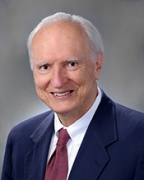About William H. Hudnut, III
William Herbert Hudnut, III served as the mayor of Indianapolis from 1976 to 1992, a 16-year term that made him Indianapolis' longest serving mayor. Hudnut was born in Cincinnati, OH and attended Princeton University, from which he graduated with high honors in 1954. He went on to graduate summa cum laude with a Master's Degree in Theology from the Union Theological Seminary in New York City.
Before his tenure as a public official, Hudnut was an ordained minister in the Presbyterian church and served as a clergyman in churches in Buffalo, NY, Annapolis, MD, and Indianapolis. He was the senior pastor of Second Presbyterian Church in Indianapolis from 1964 to 1972.
In 1972, Hudnut stepped down from his role as pastor to run in the Republican primary for Indiana's 11th congressional district. He won the nomination and went on to win the general election against Andrew Jacobs, Jr., serving one term before losing his reelection bid to Jacobs.
Hudnut's political career, however, had only just begun. In 1976 he became the mayor of Indianapolis, taking over from Richard Lugar. Hudnut entered office committed to revitalizing Indianapolis and making it a competitive American city. With an entrepreneurial bent and unafraid to take moderate risks, Hudnut led the expansion of a public-private sector partnership that boosted economic development and led to the 1980s emergence of Indianapolis as a major city. During his tenure, he opposed deficit spending and kept the city's bond rating AAA while creating tax incentives, infrastructure improvements, and development projects that attracted businesses to the downtown area. Major successes included the development of the $300 million Circle Centre downtown retail and entertainment complex, the construction of the 36-story American United Life building in the city's center, and developing $157 million worth of sports venues. Hudnut was also responsible for the negotiations that brought the Colts from Baltimore to Indianapolis and for marketing the city as the Amateur Sports Capital of the World. In December 2014, a statue of Hudnut was erected in his honor in the Hudnut Commons greenspace on the northwest corner of Maryland Street and Capitol Avenue.
Hudnut decided not to run for reelection in 1991 and his tenure as mayor ended. He went on to accept teaching and research positions at a number of universities and institutes, including the Kennedy School of Government at Harvard, the Hudson Institute in Indianapolis, the Civic Federation in Chicago, and at the Urban Land Institute in Washington, D.C.. During his time at the Urban Land Institute, Hudnut chaired or participated in 15 Advisory Services Panels (charettes) from Sacramento to Ft. Lauderdale, from Dubai to Waukeegan, chaired one charette for the Mayor's Institute of City Design, and organized and chaired 27 Mayors forums that brought together public officials, architects, developers, academics and other experts, to discuss the revitalization of cities, ranging from the impact arts and culture and parks and open space have on property values and a city's quality of life, to affordable housing and urban design. In addition, Hudnut was managing partner at Bill Hudnut Consultants, LLC and served as the mayor of Chevy Chase, Maryland. He was also a 20-year member of the National League of Cities and at one time served as its president.
Over the course of his career, Hudnut authored five books. His first, "Minister Mayor" was a reflection about his political and religious experience, while the subsequent four explored various topics in urban studies. His illustrious career won Hudnut many awards and honors, including Princeton's highest alumni honor, the Woodrow Wilson Award for public service in 1986, City and State magazine's Nation's Outstanding Mayor in 1996, and the Rosa Parks Award from the American Association for Affirmative Action in 1992. He has also received honorary degrees from 13 colleges and universities.


